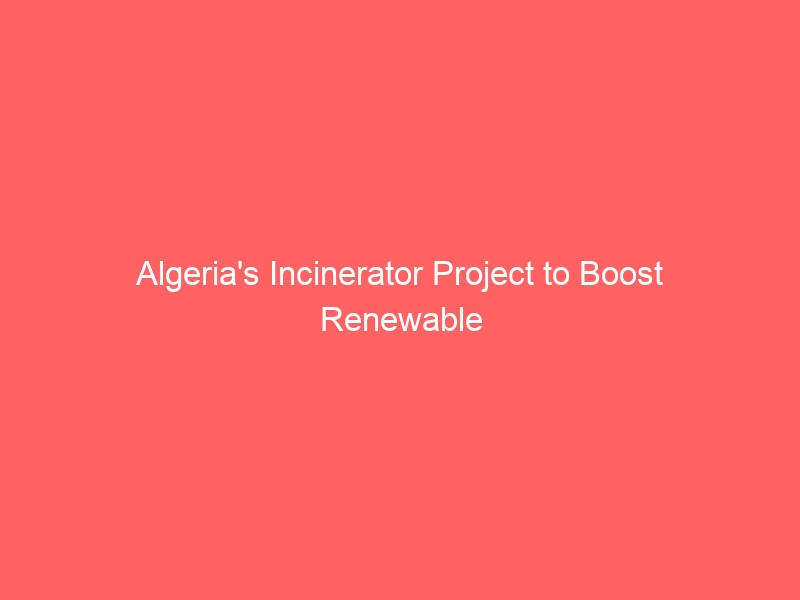Algeria, the largest country in Africa, is making significant strides in its efforts to boost renewable energy and reduce pollution through the implementation of an ambitious incinerator project. The country has long been dependent on fossil fuels for its energy needs, but with its abundant solar and wind resources, the Algerian government is now focused on diversifying its energy sources and reducing its carbon footprint.
The incinerator project, which aims to convert waste into energy, represents a major step forward in these efforts. Not only will the project help to reduce pollution and decrease the reliance on fossil fuels, but it will also contribute to the creation of green jobs and stimulate economic growth.
The Algerian government has partnered with international organizations and private companies to implement the project, which is expected to have a substantial impact on the country’s energy landscape. With its potential to produce clean, renewable energy and reduce the amount of waste sent to landfills, the incinerator project has the potential to revolutionize Algeria’s approach to energy production and waste management.
Algeria’s Commitment to Renewable Energy
Algeria has set ambitious targets for increasing its renewable energy capacity, with a goal of reaching 27% of its energy mix from renewables by 2030. This commitment is driven by the country’s desire to reduce its greenhouse gas emissions and mitigate the effects of climate change, as well as to diversify its energy sources and reduce its dependence on fossil fuels.
The incinerator project is a key part of this strategy, as it will help Algeria to harness the energy potential of its waste streams. By converting waste into electricity and heat, the project will not only reduce the country’s reliance on fossil fuels, but it will also help to alleviate the burden on landfills and reduce the environmental impact of waste disposal.
In addition to the environmental benefits, the incinerator project is expected to create new jobs and stimulate economic growth. As the project progresses, it will require a skilled workforce to design, build, and operate the incineration facilities, as well as to manage the collection and processing of waste materials. This presents an opportunity for job creation and skills development, particularly in regions where unemployment rates are high.
The Role of International Partnerships
The Algerian government has recognized the need for international collaboration to successfully implement the incinerator project. As a result, the government has engaged with international organizations and private companies to provide expertise, funding, and technological support.
One of the key partners in the project is the United Nations Development Programme (UNDP), which has been working closely with the Algerian government to develop and implement the incinerator project. Through its expertise in renewable energy and sustainable development, the UNDP has been able to provide valuable support in the planning and implementation of the project, as well as in securing funding from international donors.
Private companies have also played a critical role in the project, particularly in the development and deployment of incineration technologies. With their expertise in waste-to-energy conversion, these companies have been able to provide the technical know-how and equipment necessary to convert waste into electricity and heat.
The Role of Incineration in Waste Management
Incineration is a process that involves the combustion of waste materials to produce energy. In the context of the Algerian incinerator project, this process will involve the burning of municipal solid waste, such as household and industrial waste, to generate electricity and heat.
The incineration process consists of several stages, beginning with the collection and transport of waste materials to the incineration facility. At the facility, the waste is sorted and processed to remove any recyclable materials, such as metals and plastics, which are then segregated for further processing.
The remaining waste is then combusted in a controlled environment, where the heat produced is used to generate steam, which in turn drives turbines to produce electricity. The gases produced during combustion are treated to remove pollutants before being released into the atmosphere, ensuring that the process meets environmental standards.
FAQs
Q: Will the incinerator project increase air pollution?
A: The incinerator project is designed to comply with strict environmental standards to minimize air pollution. The emissions from the incineration process will be treated to remove pollutants before being released into the atmosphere, ensuring that the project will not increase air pollution.
Q: What will happen to the ash produced from the incineration process?
A: The ash produced from the incineration process will be carefully managed to ensure that it does not pose a risk to the environment or public health. Depending on its composition, the ash may be safely disposed of in a landfill or it may be processed further for use in construction materials.
Q: What are the expected environmental benefits of the incinerator project?
A: The incinerator project is expected to have several environmental benefits, including reducing the amount of waste sent to landfills, decreasing greenhouse gas emissions, and promoting the use of renewable energy. By converting waste into electricity and heat, the project will help to mitigate the environmental impact of waste disposal and reduce the country’s reliance on fossil fuels.
Q: Will the incinerator project create jobs?
A: Yes, the incinerator project is expected to create new jobs in a range of fields, including engineering, construction, and waste management. As the project progresses, it will require a skilled workforce to design, build, and operate the incineration facilities, as well as to manage the collection and processing of waste materials.
In conclusion, Algeria’s incinerator project represents a significant step forward in the country’s efforts to boost renewable energy and reduce pollution. Through the conversion of waste into electricity and heat, the project has the potential to revolutionize Algeria’s approach to waste management and energy production, while also creating new jobs and stimulating economic growth. With the support of international partnerships and the commitment of the Algerian government, the incinerator project is poised to have a lasting and positive impact on the country’s energy landscape and environmental sustainability.








